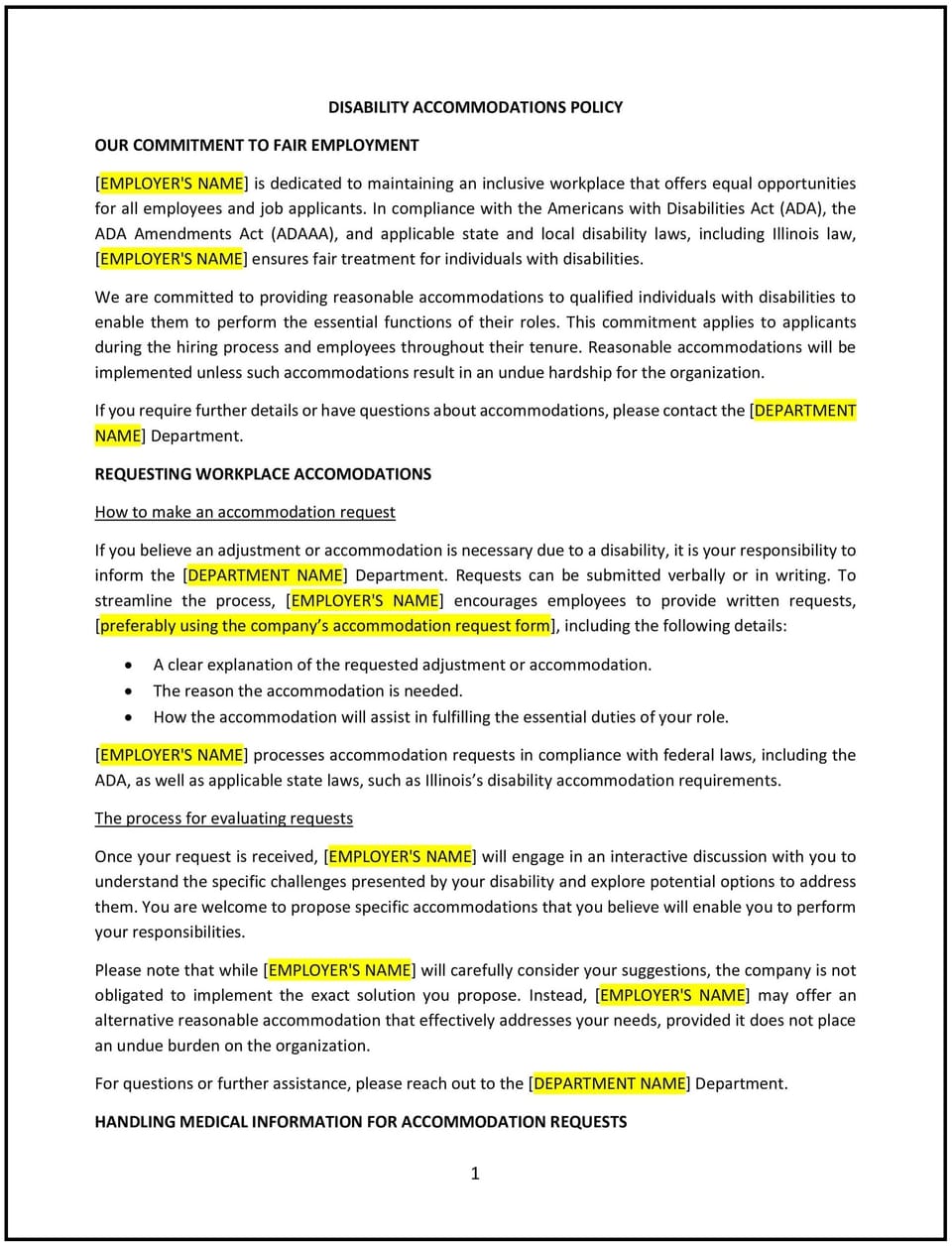Disability accommodations policy (Illinois): Free template

Disability accommodations policy (Illinois)
This disability accommodations policy is designed to help Illinois businesses provide reasonable accommodations for employees with disabilities. It outlines procedures for requesting, assessing, and implementing accommodations, improving compliance with the Americans with Disabilities Act (ADA) and the Illinois Human Rights Act.
By adopting this policy, businesses can foster an inclusive workplace, support employees with disabilities, and comply with legal requirements.
How to use this disability accommodations policy (Illinois)
- Define scope: Specify that the policy applies to all employees and job applicants who may require accommodations to perform their duties or access the workplace.
- Explain reasonable accommodations: Provide examples of accommodations, such as modified work schedules, assistive technology, or adjustments to the work environment.
- Establish request procedures: Outline how employees can request accommodations, including submitting requests to HR or a designated representative.
- Include assessment processes: Detail how accommodation requests will be assessed, including reviewing medical documentation and consulting with the employee.
- Provide implementation guidelines: Specify how approved accommodations will be implemented and monitored for effectiveness.
- Emphasize confidentiality: Assure employees that all information related to accommodation requests will be kept confidential and shared only on a need-to-know basis.
- Address undue hardship: Clarify that accommodations may not be provided if they pose significant difficulty or expense for the business, as defined by the ADA.
- Monitor compliance: Ensure adherence to Illinois laws and federal regulations through regular policy reviews and training.
Benefits of using this disability accommodations policy (Illinois)
This policy provides several benefits for Illinois businesses:
- Promotes inclusivity: Supports a diverse workforce by ensuring employees with disabilities can fully participate in the workplace.
- Enhances compliance: Aligns with the ADA and Illinois Human Rights Act to reduce legal risks.
- Encourages employee retention: Demonstrates a commitment to supporting employees with disabilities, fostering loyalty and satisfaction.
- Provides clarity: Establishes clear procedures for handling accommodation requests, ensuring consistency and transparency.
- Reduces conflicts: Offers a structured approach to resolving accommodation-related issues fairly and efficiently.
Tips for using this disability accommodations policy (Illinois)
- Communicate the policy: Share the policy with employees during onboarding and ensure it is accessible in employee handbooks.
- Train managers: Provide training on handling accommodation requests and fostering an inclusive workplace.
- Encourage open dialogue: Create a supportive environment where employees feel comfortable discussing their accommodation needs.
- Track accommodations: Maintain records of accommodation requests and outcomes to ensure accountability and compliance.
- Update regularly: Revise the policy to reflect changes in Illinois laws, workplace practices, or employee needs.
Q: What is considered a reasonable accommodation under this policy?
A: Reasonable accommodations may include modified work schedules, assistive devices, adjustments to the work environment, or other measures that enable employees to perform their job duties.
Q: How can employees request accommodations?
A: Employees can submit accommodation requests to HR or a designated representative, providing any necessary documentation to support their request.
Q: Are accommodation requests confidential?
A: Yes, all information related to accommodation requests is kept confidential and shared only with individuals directly involved in the process.
Q: What happens if an accommodation request is denied?
A: If a request is denied, the employee will be informed of the reasons, and alternative solutions may be explored if possible.
Q: Does this policy apply to job applicants?
A: Yes, job applicants are entitled to reasonable accommodations during the hiring process, such as accessible interview locations or modified testing procedures.
Q: How does the company determine undue hardship?
A: Undue hardship is determined based on factors such as the cost of the accommodation, the company’s resources, and the impact on business operations, as defined by the ADA.
Q: How often is this policy reviewed?
A: This policy is reviewed annually or whenever significant changes occur in Illinois laws or workplace practices.
Q: What training is provided under this policy?
A: Regular training is offered to managers and employees on handling accommodation requests and creating an inclusive workplace.
This article contains general legal information and does not contain legal advice. Cobrief is not a law firm or a substitute for an attorney or law firm. The law is complex and changes often. For legal advice, please ask a lawyer.


